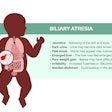
NEW YORK (Reuters Health), Oct 9 - Head growth in fetal life and infancy is associated with later intelligence, results of a study published in the October issue of Pediatrics suggest. Moreover, catch-up increases do not appear to compensate for poor early growth.
"Several studies in children have shown that those with larger brains, measured with MRI or as head circumference, tend to score higher on tests of cognitive function," Dr. Catharine R. Gale, of the University of Southampton, U.K., and colleagues write. "Similar associations have been found in adults."
The researchers examined the effect of head growth in fetal life, infancy, and childhood on cognitive function at the ages of 4 and 8 years. Included in the study were 633 term children who had their head circumference measured at birth and at regular intervals thereafter.
By age 1, mean head circumference increased from 34.9 cm at birth to 46.6 cm. Head growth after infancy was slower. Mean head circumference increased to 50.9 cm by four years and to 53.4 cm by eight years.
Mean full-scale IQ was 106.3 at four years and 105.6 at eight years. The investigators report that only prenatal growth and growth during infancy were associated with later IQ.
At four years, after adjusting for parental factors, there was an average increase in full-scale IQ of 2.41 points for each 1-SD increase in head circumference at birth and 1.97 points for each 1-SD increase in head growth during infancy. This was conditional on head size at birth.
Head circumference at birth was no longer associated with IQ at eight years. However, head growth during infancy remained significantly predictive, with full-scale IQ increasing an average of 1.56 points for each 1-SD increase in head growth.
"Brain growth in early life may be important in determining not only the level of peak cognitive function attained but also whether such function is preserved in old age," Dr. Gale and colleagues note. "Older people with a larger head circumference tend to perform better on tests of cognitive function and may have reduced risks of cognitive decline and of Alzheimer's disease."
Last Updated: 2006-10-09 11:13:09 -0400 (Reuters Health)
Pediatrics 2006;118:1486-1492.
Related Reading
Indomethacin in premature infants has gender-related brain effects, September 13, 2006
Copyright © 2006 Reuters Limited. All rights reserved. Republication or redistribution of Reuters content, including by framing or similar means, is expressly prohibited without the prior written consent of Reuters. Reuters shall not be liable for any errors or delays in the content, or for any actions taken in reliance thereon. Reuters and the Reuters sphere logo are registered trademarks and trademarks of the Reuters group of companies around the world.

















